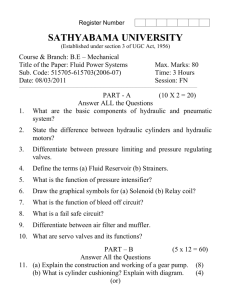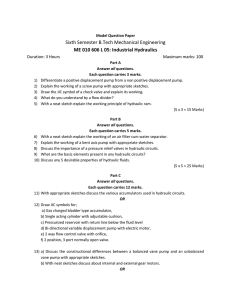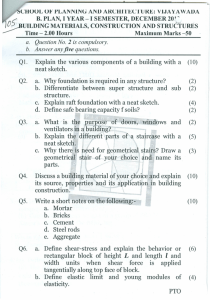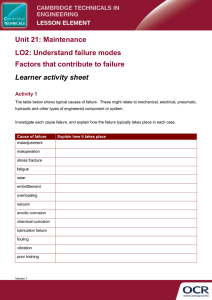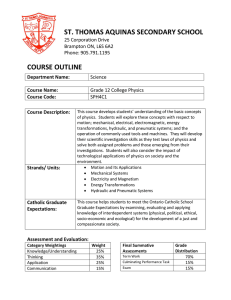HYDRAULICS AND PNEUMATICS 10ME73 1 DEPT OF
advertisement
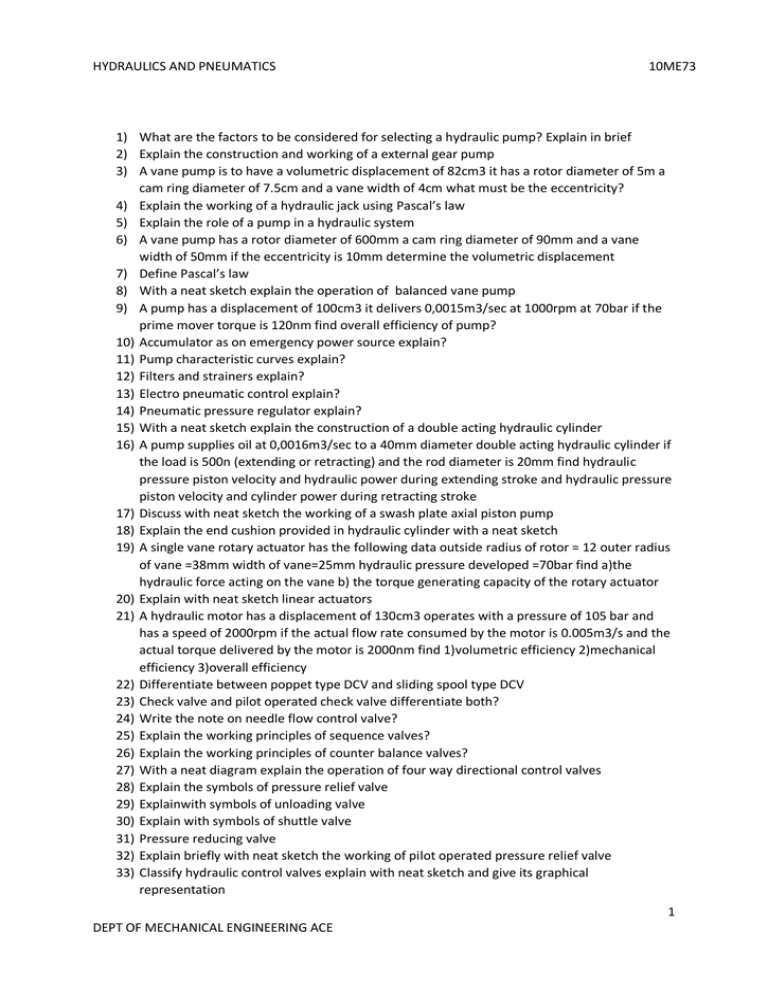
HYDRAULICS AND PNEUMATICS 10ME73 1) What are the factors to be considered for selecting a hydraulic pump? Explain in brief 2) Explain the construction and working of a external gear pump 3) A vane pump is to have a volumetric displacement of 82cm3 it has a rotor diameter of 5m a cam ring diameter of 7.5cm and a vane width of 4cm what must be the eccentricity? 4) Explain the working of a hydraulic jack using Pascal’s law 5) Explain the role of a pump in a hydraulic system 6) A vane pump has a rotor diameter of 600mm a cam ring diameter of 90mm and a vane width of 50mm if the eccentricity is 10mm determine the volumetric displacement 7) Define Pascal’s law 8) With a neat sketch explain the operation of balanced vane pump 9) A pump has a displacement of 100cm3 it delivers 0,0015m3/sec at 1000rpm at 70bar if the prime mover torque is 120nm find overall efficiency of pump? 10) Accumulator as on emergency power source explain? 11) Pump characteristic curves explain? 12) Filters and strainers explain? 13) Electro pneumatic control explain? 14) Pneumatic pressure regulator explain? 15) With a neat sketch explain the construction of a double acting hydraulic cylinder 16) A pump supplies oil at 0,0016m3/sec to a 40mm diameter double acting hydraulic cylinder if the load is 500n (extending or retracting) and the rod diameter is 20mm find hydraulic pressure piston velocity and hydraulic power during extending stroke and hydraulic pressure piston velocity and cylinder power during retracting stroke 17) Discuss with neat sketch the working of a swash plate axial piston pump 18) Explain the end cushion provided in hydraulic cylinder with a neat sketch 19) A single vane rotary actuator has the following data outside radius of rotor = 12 outer radius of vane =38mm width of vane=25mm hydraulic pressure developed =70bar find a)the hydraulic force acting on the vane b) the torque generating capacity of the rotary actuator 20) Explain with neat sketch linear actuators 21) A hydraulic motor has a displacement of 130cm3 operates with a pressure of 105 bar and has a speed of 2000rpm if the actual flow rate consumed by the motor is 0.005m3/s and the actual torque delivered by the motor is 2000nm find 1)volumetric efficiency 2)mechanical efficiency 3)overall efficiency 22) Differentiate between poppet type DCV and sliding spool type DCV 23) Check valve and pilot operated check valve differentiate both? 24) Write the note on needle flow control valve? 25) Explain the working principles of sequence valves? 26) Explain the working principles of counter balance valves? 27) With a neat diagram explain the operation of four way directional control valves 28) Explain the symbols of pressure relief valve 29) Explainwith symbols of unloading valve 30) Explain with symbols of shuttle valve 31) Pressure reducing valve 32) Explain briefly with neat sketch the working of pilot operated pressure relief valve 33) Classify hydraulic control valves explain with neat sketch and give its graphical representation 1 DEPT OF MECHANICAL ENGINEERING ACE HYDRAULICS AND PNEUMATICS 34) 35) 36) 37) 38) 39) 40) 41) 42) 43) 44) 45) 46) 47) 48) 49) 50) 51) 52) 53) 54) 55) 56) 57) 58) 59) 60) 61) 62) 63) 64) 65) 66) 67) 68) 69) 10ME73 Draw symbolic representation of simple pressure relief valve Draw symbolic representation of pressure reducing valve Draw symbolic representation of sequence valve Draw symbolic representation of counter balance valve Draw symbolic representation of manually operated spring controlled here position four way valves Explain with suitable circuits how the single acting of hydraulic cylinders Design and explain the hydraulic power circuit for sequencing of the following operation in a drilling machine a) clamping the work piece 2) drilling the work piece 3) undamping the work piece With the help of neat circuit diagram explain the counter balance valve application With the help of neat circuit diagram explain the use of accumulator as a hydraulic shock absorber With the help of neat circuit diagram explain locked cylinder using pilot check valves Explain with neat sketches meter in and meter out circuits What are hydraulic accumulators classify the different accumulators used in hydraulic system and explain spring loaded hydraulic accumulator Explain with the help of a hydraulic circuit how the cylinder speed Can be controlled by metering out oil from the cylinder Compare a dead weight type accumulator with a spring loaded type accumulator explain their merits and demerits Derive an equation for beta efficiency Explain briefly filters and strainers n hydraulic system Derive expression for beta efficiency Discuss about sealing devices What are the problems caused by gases in hydraulic fluids? What are the parameters we consider for sizing of a reservoir Explain sealing devices used in hydraulic systems Differentiate between the following 1) single acting and double acting pneumatic cylinder 2) air motor and air cylinder Explain with neat sketch the working of valve seat four way two position direction control valve Write a note on cylinder mountings What are the advantages using pneumatic system Explain with neat sketch and cushion arrangements in double acting cylinder List any eight applications of compressed air With a neat sketch explain the construction of end cushioning With a neat sketch explain any four mounting arrangement of pneumatic cylinders With a circuit diagram explain the use of memory valve Explain a pneumatic circuit based on or logic gate With a neat diagram explain quick exhaust valve Explain the principle ad procedure for cascade system With a neat diagram explain the function of a lubricator in pneumatic circuits What do you mean by quick exhaust valve explain its working principle with a sketch Explain with a pneumatic circuit he control of extension of a double acting cylinder using or and and logic gates 2 DEPT OF MECHANICAL ENGINEERING ACE HYDRAULICS AND PNEUMATICS 10ME73 70) With a neat sketch explain how the following functions are generated in pneumatic systems 1)and 2)not 3)or 71) Explain quick exhaust valve with its graphical symbol only 72) Elecropneumatic control with neat sketch explain 73) Explain with diagram application of memory valve 74) Explain with block diagram needle flow control valve 75) Explain with sketch air dryers 76) Explain why oil is preferred in fluid power system instead of water 77) What are the advantages of NP pumps 78) What are the advantages of PDP pumps 79) Distinguish between closed loop and open loop fluid power system 80) List out the fluid power application 81) Enumerate the differences between reciprocating and rotary pumps 82) List out the main parts of a vane pump 83) Explain why gear pumps are fixed displacement pumps 84) Explain the concept of extension and retraction with respect to a linear actuator 85) Explain with neat sketch gravity return 86) List out the different applications of cylinders 87) List out the common problems associated with cylinders 88) What is the functions of a counter balancing valve 89) What is the function of check valves 90) What are the basic functions or pressure controlled valves. 91) Define pneumatic system. Give the difference between hydraulic and pneumatic system. 92) Explain end position cushioning in pneumatic cylinder with diagram. 93) Explain the following (1) magnetic type rodless cylinder (2) cable type rodless cylinder 94) With the help of suitable circuit, explain the following: (1) suction line filtering (2) pressure line filtering 95) What are the functions of reservoir system? Explain briefly with neat sketch construction of reservoir system 96) List six desirable properties of hydraulic fluid and explain any two properties. 97) With neat sketch, discuss sealing devices. 98) With neat sketch, explain full flow filter. 99) What are the problems caused by gases in hydraulic fluids? 100) What are the parameters we consider for sizing of a reservoir? 101) Explain the characteristics of compressed air. 102) State five disadvantages of using air instead of hydraulic oil. 103) Explain the construction of double acting cylinder used in pneumatics with neat sketch\ 3 DEPT OF MECHANICAL ENGINEERING ACE
